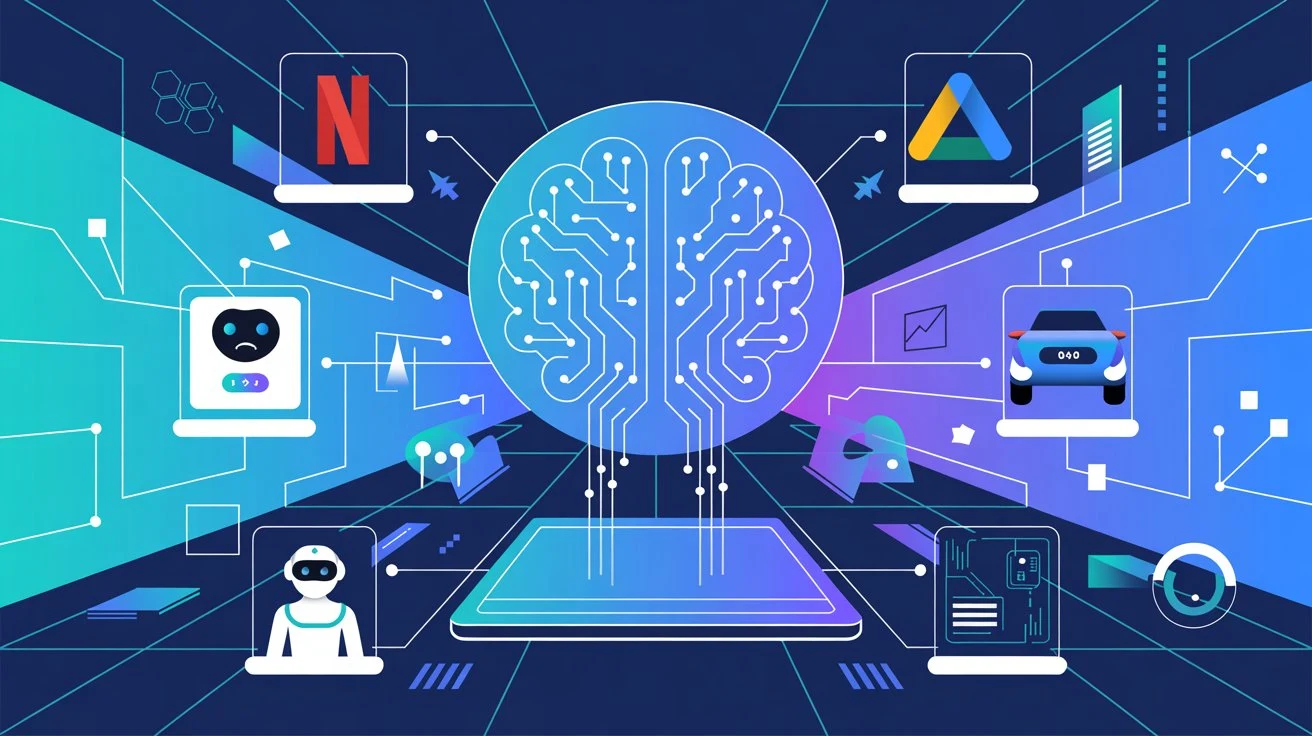What is Inference Engines: How AI & ChatGPT Work (+ 5 Real Uses)

Did you know ChatGPT processes over 10,000 inferences every second just to answer your simple questions?
Artificial Intelligence (AI) is everywhere today. From suggesting your next favorite Netflix series to protecting your bank account from fraud, AI quietly influences our decisions and daily lives.
At the heart of AI is something called an "inference engine." Think of it as the brain inside the AI that makes sense of data and turns it into useful actions or decisions. If AI were a car, the inference engine would be its driver, deciding when to speed up, slow down, or turn.
When you ask ChatGPT, "What's the best digital marketing strategy for summer in Pune?" it isn't just guessing. Behind the scenes, a sophisticated inference engine quickly analyzes patterns and rules from vast data, delivering precise, helpful answers like, "Use vibrant social media videos and summer-themed keywords to engage your audience."
In this blog, we'll explore how inference engines work, their crucial role in AI systems like ChatGPT, and the real-world ways they're helping businesses and everyday life.
What is an Inference Engine?
In simple words, an inference engine is like the "chef" in the kitchen of AI. It takes raw ingredients (data) and follows a recipe (logical rules) to create a final dish (decision or prediction). It's the smart part of AI that connects the dots and helps machines think and respond.
Technically, an inference engine applies logical rules to a knowledge base (the collection of facts and data) to generate new, meaningful insights or answers. Think of it like a detective solving a case. The detective gathers clues (data), matches them against known facts (rules), and deduces who committed the crime (final inference).
Components of an Inference Engine:
- Knowledge Base: This contains all the information, facts, and rules the AI knows. For ChatGPT, this includes billions of words and patterns it learned during training.
- Inference Engine: This part processes data, applies logical rules, and makes decisions or predictions.
For example, if you ask a healthcare chatbot, "I have a fever and cough; do I have flu?" the inference engine quickly matches these symptoms against a medical knowledge base and logically concludes a probable diagnosis.
How Inference Engines Power AI & ChatGPT
To understand how ChatGPT generates human-like responses, we need to see how inference engines work behind the scenes.
When you type a question into ChatGPT, it doesn't randomly pick words. Instead, the inference engine follows a structured process:
Step-by-Step Process:
- Input: You ask ChatGPT something like, "What's the best digital marketing strategy for Pune businesses?"
- Knowledge Base: ChatGPT accesses a huge set of training data, which includes billions of words and their patterns collected from the internet. This knowledge base is like a massive library full of useful information.
- Inference Engine: It analyses your question, understands the context (digital marketing, Pune, strategies), and logically processes the data. It identifies patterns from similar past interactions.
- Output: Finally, it generates a personalized, human-like response tailored specifically to your query, such as, "For Pune businesses, leverage local social media influencers and location-based SEO to attract local customers."
ChatGPT Example:
When you ask ChatGPT, "Suggest a creative marketing slogan for a Pune café," its inference engine quickly understands your intent (marketing slogan for a café targeting Pune), scans the knowledge base, and crafts a catchy slogan like, "Taste Pune's Heartbeat at Every Sip!"
Without an inference engine, ChatGPT would have no way to connect your questions with helpful answers—it would be like trying to find a book in a library without a catalog.
9 Real-World Uses of Inference Engines
Inference engines aren't limited to chatbots or AI assistants; they're embedded in numerous real-world applications you encounter daily. Here are five relatable examples:
1. Healthcare Diagnosis
AI chatbots use inference engines to identify diseases based on symptoms. If you input symptoms like fever, cough, and tiredness, the engine matches these against medical databases to suggest possible conditions, such as flu or COVID-19.
2. E-commerce Recommendations
Ever wondered how Amazon or Flipkart always knows what you might buy next? They use inference engines. These engines analyze your previous browsing history and shopping patterns to recommend products that match your preferences.
3. Customer Service Chatbots
When you type, "Where's my order?" on a customer service chat, the inference engine quickly matches your query against its rules to provide accurate tracking information. This automation saves businesses time and enhances customer satisfaction.
4. Finance and Fraud Detection
Banks utilize inference engines to protect your account. Suppose your card is suddenly used to buy 100 televisions in Peru. The inference engine detects this unusual transaction pattern, flags it as potential fraud, and alerts you immediately.
5. Digital Marketing Automation
AI-powered marketing tools use inference engines to create personalized ad copies or identify optimal keywords. For instance, a Pune-based digital marketing agency might automatically generate an ad like, "Enjoy Monsoon Offers at Pune's Best Restaurants!"
6. Netflix Recommendations: Deciding Your Next Favourite Show
When you finish watching a movie or series on Netflix, the app quickly suggests something new to watch. How does it do this? Netflix uses an inference engine that analyses what you've watched, liked, or skipped. By connecting these dots, it recommends content that fits your taste. For instance, if you've watched crime thrillers recently, Netflix suggests more gripping crime series to keep you engaged.
7. Google Ads: Personalizing Ads You See
Have you noticed that after searching for shoes on Google, suddenly you see shoe ads everywhere? Google's inference engine picks up your search history and online habits. It figures out your interests and preferences, deciding which ads to display. This helps businesses target customers effectively, and helps you discover products relevant to your interests.
8. Self-Driving Cars: Making Critical Driving Decisions
Self-driving cars rely heavily on inference engines to operate safely. When a self-driving car approaches a stop sign or sees a pedestrian, its inference engine instantly processes the information. It decides to slow down, stop, or change direction. These real-time decisions keep everyone safe and ensure smooth driving experiences.
9. Fraud Detection: Protecting Your Bank Accounts
Inference engines are essential in spotting suspicious financial activities. Suppose someone attempts to buy 100 TVs in Peru using your credit card. The inference engine identifies this unusual activity based on your usual spending habits and immediately flags it as possible fraud. You then get notified instantly, helping protect your money from theft.
Why Businesses Should Care
Inference engines are powerful tools that can greatly help businesses, no matter their size or industry. Here's why they matter:
Faster and Smarter Decisions
Inference engines analyze huge amounts of data quickly and accurately, helping businesses make rapid, informed decisions. For example, if you run an online store, inference engines instantly tell you which products your customers are most likely to buy next.
Scalability
These AI systems easily manage tasks as your business grows. Whether you handle 10 customers or 10,000, inference engines efficiently process data without slowing down.
Reduced Human Errors
Humans naturally make mistakes, especially when handling repetitive tasks. An inference engine, however, follows logical rules precisely, reducing costly errors and improving accuracy.
Local Example for Pune Businesses
Imagine Pune restaurants using AI-driven chatbots to handle table bookings automatically. Customers can easily reserve tables via chat, reducing the workload for restaurant staff and increasing customer satisfaction.
Digital Marketing Advantage
Businesses, especially in digital marketing, can benefit greatly. AI tools equipped with inference engines can automate keyword selection, content creation, and targeted ad placement. Pune-based agencies like Public Media Solution effectively leverage these capabilities to deliver precise marketing strategies for clients.
Final Words: The Future of AI-Driven Decisions
Inference engines are the heart of artificial intelligence, enabling systems like ChatGPT to "think" logically and respond intelligently. As businesses increasingly embrace digital transformation, inference engines will become even more important in shaping smarter, quicker, and more accurate decisions.
With inference engines, the possibilities are endless—from improving customer interactions to predicting market trends and automating routine tasks. Businesses that understand and adopt these technologies now will stay ahead of their competition.
Ready to leverage AI for your Pune business? Public Media Solution integrates advanced AI tools into effective digital marketing strategies. Contact Us to learn more and start profiting from AI-powered decisions today!

Buddhisagar Bhosale
SEO Executive - Public Media Solution
Buddhisagar Bhosale is the SEO Executive at Public Media Solution, a leading marketing, PR, and branding company based in India.